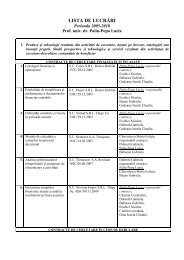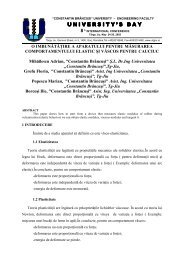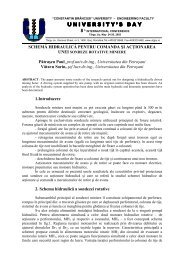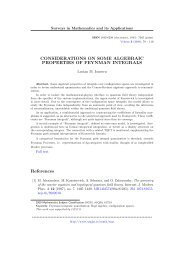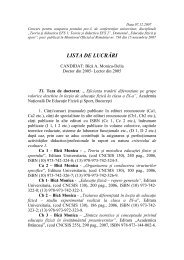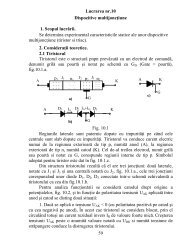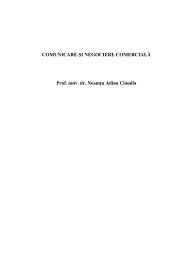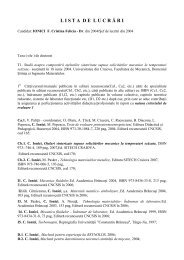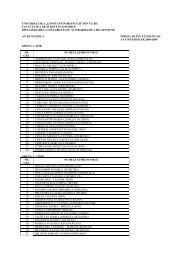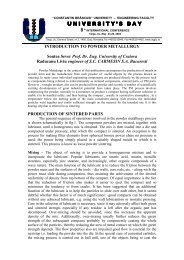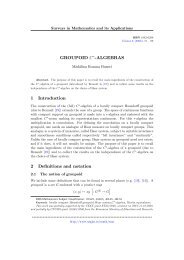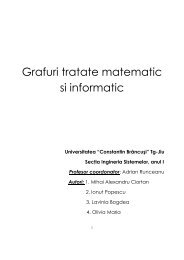Analele Universităţii “<strong>Constantin</strong> Brâncuşi” din Târgu Jiu, Seria Litere şi Ştiinţe Sociale, Nr. 2/<strong>2008</strong>„Democraţie! Numele propus al unui lucrucare nu există”, i-ar fi cuprins opera.În opinia mea 12 , această exclamaţie nueste nici pe departe compromiţătoare ci,dimpotrivă, atrage atenţia unei multitudini deprobleme pe care le ridică însuşi conceptul dedemocraţie din perspectiva unei insuficienţe(dacă nu chiar a unei crize) epistemice îndomeniu. Diferenţa concept iniţial – conceptactual, concept actual – realitate factuală estedeopotrivă, una istorică, dar şi semantică –tocmai prin extensia referenţialului. Abordărileregimurilor democratice sunt preocupate atâtde geneza, evoluţia şi funcţionarea acestui tipde regim, dar şi de posibilele evoluţii în viitor;în acelaşi timp, intensitatea şi constanţadezbaterilor nu pot face abstracţie de aspecteleistorice comune şi nici de elementele specificeale regimurilor democratice. „Ceea ceînţelegem noi prin democraţie nu este ceea ceînţelegea un atenian din timpul lui Pericle –scrie R. Dahl. Noţiuni greceşti, romane,medievale şi renascentiste se îmbină în noţiunidin secole mai apropiate, pentru a produce unamestec adesea extrem de inconştient de teorieşi metode” 13 . Tocmai de aceea, o definiţieconsistentă a democraţiei este dificilă, darştiinţa politică azi ia în considerare tot maimult definiţia lui Schumpeter: „… metodademocratică este acea ordine instituţională princare se ajunge la decizii politice, ordine în careunele persoane obţin dreptul de a decide, înurma unei înfruntări concurenţiale pentruobţinerea votului popular” 14 . Definiţia are şimerite – ilustrarea caracterului concurenţial şiedificator al alegerilor, includerea principiuluireacţiilor prevăzute (Friedrich), dar este şi preaprocedurală, ceea ce unilateralizeazăconţinutul conceptului. Se poate constata cădemocraţia – înţeleasă ca metodă, ca ordineinstituţională prin care se ajunge la deciziipolitice, este explicitată prin rangul de mijloc(în sens kantian, prin scopuri relative,corespunzătoare imperativelor ipotetice). Dardemocraţia este produs (regim politic) şiproces prin care realul (ontisul social)înglobează gradual dezideratul (înţeles aici şica posibil virtual). Originat în sistemul politic(ca orice regim politic), regimul democraticpeople, transforming the political life almost atthe same time in Athens (and other cities–Greek states), as well as in the castle state –Rome 26 . Many authors have considered thatGiovani Sartori’s exclamation: „Democracy!The name for a thing which does not exist”,included its work.In my opinion 27 , this exclamation is notcompromising, but on the contrary, it draws theattention of many problems of the concept ofdemocracy itself from the view of an epistemiclack (or even a crisis) in the field. Thedifference between the initial concept – currentconcept – actual reality is both historical andsemantic – through the extension of thereferential. The approaches of democraticsystems are concerned both with the genesis,evolution and working of this type of system, aswell as with its possible evolutions in the future;at the same time, the intensity and constancy ofdebates cannot exclude common historicalaspects or the specific elements of democraticsystems. “What we understand by democracy isnot what an Athenian from Pericles’ time usedto understand– says R. Dahl. Greek, Roman,Medieval, and Renaissance notions combinefrom more recent centuries, to produce amixture of theory and methods which issometimes unconscious” 28 . This is why, aconsistent definition of democracy is difficult,but political science today takes intoconsideration Schumpeter’s definition more andmore: „… democratic method is thatinstitutional order for reaching to politicaldecisions, orders where people get the right todecide, after a concurrent confrontation forgetting popular vote” 29 . This definition hascredits – illustrating the concurrent and edifyingcharacter of elections, including the principle ofpredicted reactions (Friedrich), but at the sametime it is also too procedural, which makes theconcept content too unilateral. We can establishthat democracy – understood as method, asinstitutional order for reaching politicaldecisions, is explained through the middle rank(in Kant’s meaning, through relative purposes,corresponding to hypothetical imperatives). Butdemocracy is a product (political system) andprocess through which reality (social ontis0Annals of the „<strong>Constantin</strong> Brâncuşi” University of Târgu Jiu, Series Letters and Social Sciences, No. 2/<strong>2008</strong>12
Analele Universităţii “<strong>Constantin</strong> Brâncuşi” din Târgu Jiu, Seria Litere şi Ştiinţe Sociale, Nr. 2/<strong>2008</strong>este modalitatea esenţială prin care politicul sefenomenalizează în ipostaze deziderat şiipostaze real. Concret, în guvernareaexercitată de „mulţi” şi idealul exercităriiguvernării de către câţi mai mulţi. Ea este,deopotrivă, un proces inclusiv şi exclusiv, unregim politic, dar şi un mod de guvernare (deviaţă). Ea implică, deopotrivă, potentia şipotestas, puissance şi pouvoir. Ea este, înesenţă, un regim al puterii politice, dar şi omăsură a gradului în care acest regim (cadeziderat al autoguvernării) satisface condiţiaumană într-un asemenea tip de comunitate, iaraceastă măsură – ca rezultat al autoevaluăriiindividuale (ca medie statistică al acestorautoevaluări), implică imanenţa culturiipolitice şi, pe cale de consecinţă, a unui gradde cunoaştere. Conştiinţa de sine a individuluiva conţine elemente sistematice (si nu doarspontane), în măsura în care ea sefundamentează în structuri cognitive şiaxiologice. În grade şi ranguri diferite. Funcţiede nivelul acestor grade şi ranguri,consecinţele democraţiei vor fi receptate maimult spontan sau mai mult elaborat. Gradul deprelucrare (capacitatea individului) al faptuluidemocratic brut va conduce la opinii(subiectual verosimile), sau la cunoştinţe (cuatributele de adevărate şi temeinice). Aici esteterenul (în acest interval) de diferenţiere între„percepţia fantomă” a democraţiei, „teoriafantomă” şi o teorie ştiinţifică. Între opiniaverosomil subiectuală, opinia obiectivată(opinia publică) şi cunoaşterea ştiinţifică ademocraţiei. Dar cum democraţia este regimulexercitării puterii de către cei mulţi, cutendinţa dezirabilă, de către cât mai mulţi estecert că opinia publică devine standardul(etalonul) de raportare în elaborarearăspunsului la întrebarea: cât de bun esteregimul democratic? Şi chiar în angrenajulglobalizării şi societăţii cunoaşterii,reconstrucţia experimentelor democraticetrăite, acceptarea guvernării democratice dreptaxiomă, acceptarea extinderii sferei departicipare politică şi a ideii universalităţiivotului, a pluralismului şi compromisului, acontaminării pozitive în planulinternaţionalului nu reprezintă argumenteincludes the desiderate gradually (understoodhere as a possible virtual). Originating in thepolitical system (as any political system),democratic system is the essential way for thepolitics to transform into desiderate hypothesesand real hypotheses. In fact, governmentexercised by “the many” and the ideal ofexercising the government by as many aspossible. It is at the same time, an inclusive andexclusive process, a political system and a formof government (of life). It involves at the sametime, potentia and potestas, puissance andpouvoir. It is mainly a system of the politicalpower, but a measurement for the degree inwhich this system (as self-governmentdesiderate) complies with the human conditionin such a type of community, and this measure– as result of individual self-evaluation (as astatistic mean of these self-assessments),involves the immanence of political culture andconsequently a degree of knowledge. Man’sself-conscience shall include systematicelements (not just spontaneous), to the extent towhich it is fundamented in cognitive andaxiological structures into different degrees andranks. In accordance with the level of thesedegrees and ranks, the consequences ofdemocracy shall be received morespontaneously and more elaborately. Theprocessing degree (individual’s ability) of thegross democratic act shall lead to opinions(subjectively credible) or knowledge (with realand grounded attributes). This is the field(within this interval) of differentiation betweenthe “phantom reception” of democracy, “thephantom theory” and a scientific theory,between the credibly subjectual opinion, theobjective opinion (public opinion) and thescientific knowledge of democracy. But takinginto consideration that democracy is the systemof exercising the power by the many, with adesirable tendency, by as many, it is certain thatpublic opinion becomes the standard ofreporting in elaborating the answer to thequestion: how good is the democratic system?And even under the circumstance ofglobalization and the society of knowledge, thereconstruction of lived democratic experiments,accepting the democratic government as anAnnals of the „<strong>Constantin</strong> Brâncuşi” University of Târgu Jiu, Series Letters and Social Sciences, No. 2/<strong>2008</strong>13
- Page 5: CUPRINS:1. CUNOAŞTERE - CULTURĂ
- Page 8 and 9: Analele Universităţii “Constant
- Page 10 and 11: Analele Universităţii “Constant
- Page 12 and 13: Analele Universităţii “Constant
- Page 16 and 17: Analele Universităţii “Constant
- Page 18 and 19: Analele Universităţii “Constant
- Page 20 and 21: Analele Universităţii “Constant
- Page 22 and 23: Analele Universităţii “Constant
- Page 24 and 25: Analele Universităţii “Constant
- Page 26 and 27: Analele Universităţii “Constant
- Page 28 and 29: Analele Universităţii “Constant
- Page 30 and 31: Analele Universităţii “Constant
- Page 32 and 33: Analele Universităţii “Constant
- Page 34 and 35: Analele Universităţii “Constant
- Page 36 and 37: Analele Universităţii “Constant
- Page 38 and 39: Analele Universităţii “Constant
- Page 40 and 41: Analele Universităţii “Constant
- Page 42 and 43: Analele Universităţii “Constant
- Page 44 and 45: Analele Universităţii “Constant
- Page 46 and 47: Analele Universităţii “Constant
- Page 48 and 49: Analele Universităţii “Constant
- Page 50 and 51: Analele Universităţii “Constant
- Page 52 and 53: Analele Universităţii “Constant
- Page 54 and 55: Analele Universităţii “Constant
- Page 56 and 57: Analele Universităţii “Constant
- Page 58 and 59: Analele Universităţii “Constant
- Page 60 and 61: Analele Universităţii “Constant
- Page 62 and 63: Analele Universităţii “Constant
- Page 64 and 65:
Analele Universităţii “Constant
- Page 66 and 67:
Analele Universităţii “Constant
- Page 68 and 69:
Analele Universităţii “Constant
- Page 70 and 71:
Analele Universităţii “Constant
- Page 72 and 73:
Analele Universităţii “Constant
- Page 74 and 75:
Analele Universităţii “Constant
- Page 76 and 77:
Analele Universităţii “Constant
- Page 78 and 79:
Analele Universităţii “Constant
- Page 80 and 81:
Analele Universităţii “Constant
- Page 82 and 83:
Analele Universităţii “Constant
- Page 84 and 85:
Analele Universităţii “Constant
- Page 86 and 87:
Analele Universităţii “Constant
- Page 88 and 89:
Analele Universităţii “Constant
- Page 90 and 91:
Analele Universităţii “Constant
- Page 92 and 93:
Analele Universităţii “Constant
- Page 94 and 95:
Analele Universităţii “Constant
- Page 96 and 97:
Analele Universităţii “Constant
- Page 98 and 99:
Analele Universităţii “Constant
- Page 100 and 101:
Analele Universităţii “Constant
- Page 102 and 103:
Analele Universităţii “Constant
- Page 104 and 105:
Analele Universităţii “Constant
- Page 106 and 107:
Analele Universităţii “Constant
- Page 108 and 109:
Analele Universităţii “Constant
- Page 110 and 111:
Analele Universităţii “Constant
- Page 112 and 113:
Analele Universităţii “Constant
- Page 114 and 115:
Analele Universităţii “Constant
- Page 116 and 117:
Analele Universităţii “Constant
- Page 118 and 119:
Analele Universităţii “Constant
- Page 120 and 121:
Analele Universităţii “Constant
- Page 122 and 123:
Analele Universităţii “Constant
- Page 124 and 125:
Analele Universităţii “Constant
- Page 126 and 127:
Analele Universităţii “Constant
- Page 128 and 129:
Analele Universităţii “Constant
- Page 130 and 131:
Analele Universităţii “Constant
- Page 132 and 133:
Analele Universităţii “Constant
- Page 134 and 135:
Analele Universităţii “Constant
- Page 136 and 137:
Analele Universităţii “Constant
- Page 138 and 139:
Analele Universităţii “Constant
- Page 140 and 141:
Analele Universităţii “Constant
- Page 142 and 143:
Analele Universităţii “Constant
- Page 144 and 145:
Analele Universităţii “Constant
- Page 146 and 147:
Analele Universităţii “Constant
- Page 148 and 149:
Analele Universităţii “Constant
- Page 150 and 151:
Analele Universităţii “Constant
- Page 152 and 153:
Analele Universităţii “Constant
- Page 154 and 155:
Analele Universităţii “Constant
- Page 156 and 157:
Analele Universităţii “Constant
- Page 158 and 159:
Analele Universităţii “Constant
- Page 160 and 161:
Analele Universităţii “Constant
- Page 162 and 163:
Analele Universităţii “Constant
- Page 164 and 165:
Analele Universităţii “Constant
- Page 166 and 167:
Analele Universităţii “Constant
- Page 168 and 169:
Analele Universităţii “Constant
- Page 170 and 171:
Analele Universităţii “Constant
- Page 172 and 173:
Analele Universităţii “Constant
- Page 174 and 175:
Analele Universităţii “Constant
- Page 176 and 177:
Analele Universităţii “Constant
- Page 178 and 179:
Analele Universităţii “Constant
- Page 180 and 181:
Analele Universităţii “Constant
- Page 182 and 183:
Analele Universităţii “Constant
- Page 184 and 185:
Analele Universităţii “Constant
- Page 186 and 187:
Analele Universităţii “Constant
- Page 188 and 189:
Analele Universităţii “Constant
- Page 190 and 191:
Analele Universităţii “Constant
- Page 192 and 193:
Analele Universităţii “Constant
- Page 194 and 195:
Analele Universităţii “Constant
- Page 196 and 197:
Analele Universităţii “Constant
- Page 198 and 199:
Analele Universităţii “Constant
- Page 200 and 201:
Analele Universităţii “Constant
- Page 202 and 203:
Analele Universităţii “Constant



